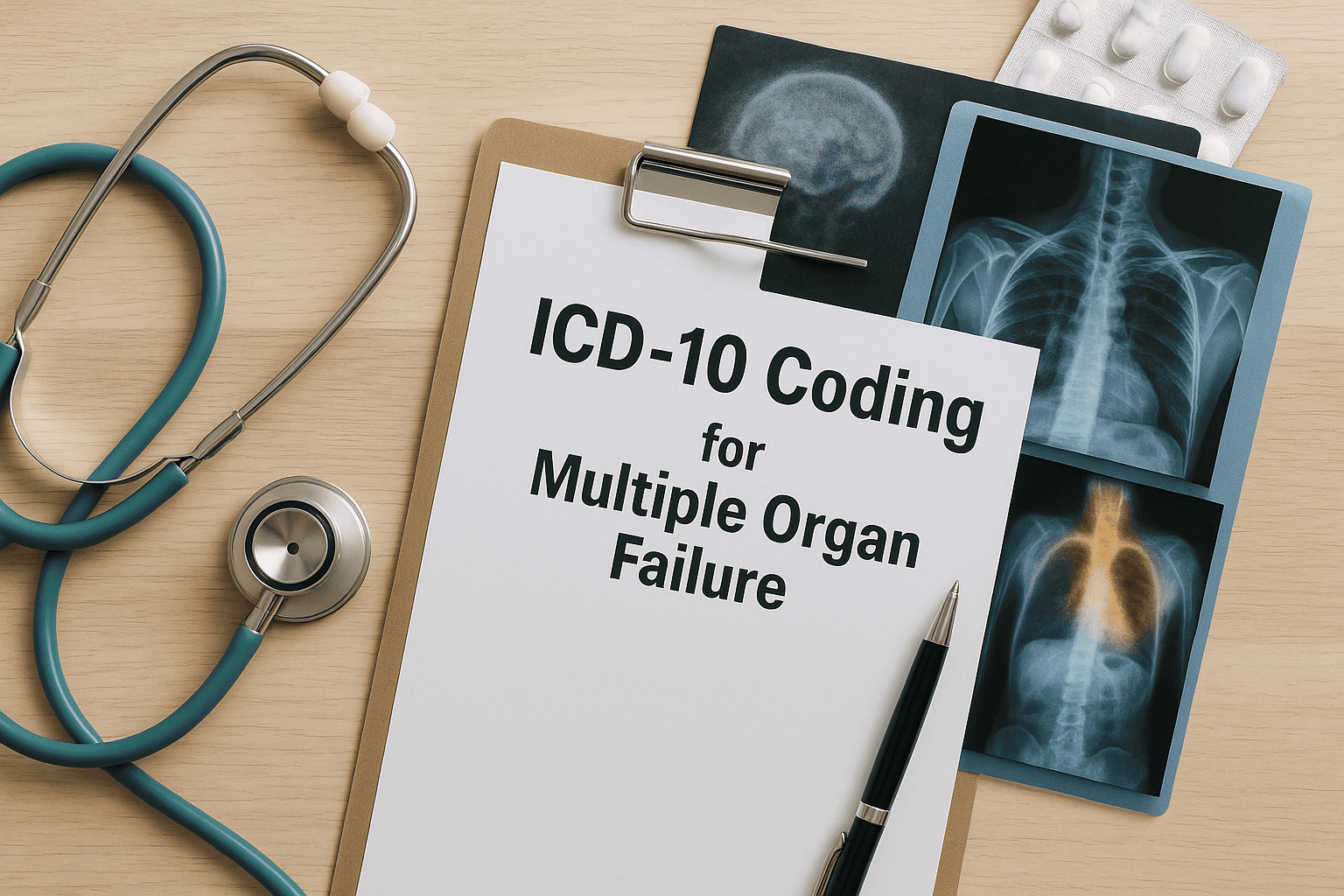Updated on: July 21, 2025
Multiple Organ Failure (MOF), also known as Multiple Organ Dysfunction Syndrome (MODS), represents a critical stage of systemic illness where two or more organ systems fail simultaneously. It often results from sepsis, trauma, or acute pancreatitis and remains one of the leading causes of ICU mortality worldwide.
For clinicians, hospitals, and medical consultants, accurate diagnosis, timely intervention, and precise ICD-10 coding are crucial for both patient outcomes and reimbursement optimization.
In this article, we explore:
-
What multiple organ failure is
-
How it presents clinically
-
The correct ICD-10 coding pathways
-
And how AI-powered documentation tools like DocScrib can assist in capturing critical details in real time.
What is Multiple Organ Failure?
Multiple Organ Failure (MOF) is defined as the progressive dysfunction of two or more vital organ systems, such as the heart, lungs, kidneys, liver, or central nervous system. It can occur acutely (within hours to days) or develop over time in hospitalized or critically ill patients.
Common Causes of MOF:
-
Sepsis and Septic Shock
-
Major Trauma
-
Burns
-
Severe Pancreatitis
-
Acute Respiratory Distress Syndrome (ARDS)
-
Massive Transfusions
Organs Commonly Affected:
-
Lungs (respiratory failure, ARDS)
-
Kidneys (acute kidney injury)
-
Liver (hepatic failure)
-
Heart (cardiogenic shock)
-
Coagulation system (DIC)
-
Brain (encephalopathy)
Clinical Presentation and Early Recognition
MOF typically presents as a cascade of systemic symptoms:
-
Respiratory distress or hypoxemia despite oxygen therapy
-
Hypotension and tachycardia
-
Altered mental status
-
Rising creatinine or oliguria
-
Elevated liver enzymes
-
Coagulopathy or abnormal INR/PTT
-
Lactic acidosis
Prompt recognition is vital because early intervention in the ICU improves survival rates.
ICD-10 Coding for Multiple Organ Failure
Accurate documentation is not just a billing necessity—it also supports continuity of care and clinical benchmarking.
Most Common ICD-10 Codes for MOF:
| ICD-10 Code | Description |
|---|---|
| R65.21 | Severe sepsis with septic shock |
| R65.20 | Severe sepsis without septic shock |
| J96.00 – J96.92 | Acute respiratory failure, unspecified, or with hypoxia/hypercapnia |
| N17.9 | Acute kidney failure, unspecified |
| K72.90 | Hepatic failure, unspecified without coma |
| R57.0 | Cardiogenic shock |
| D65 | Disseminated intravascular coagulation |
| G93.40 | Encephalopathy, unspecified |
💡 Use multiple ICD-10 codes to represent the full spectrum of organ involvement.
Coding Tips:
-
Always link organ failure codes to the underlying cause (e.g., infection, trauma, sepsis).
-
Document if the organ failure is acute, chronic, or unspecified.
-
Note the presence of shock, coma, or respiratory distress clearly in the HPI or assessment.
-
Include 7th character extensions where applicable (e.g., initial, subsequent, sequela).
How Docscrib Makes ICD-10 Coding for MOF Seamless
Clinicians in high-acuity environments rarely have time to manually enter every code or descriptor. That’s where DocScrib comes in.
💡 AI That Understands Clinical Context
DocScrib listens passively during patient encounters and extracts real-time cues for documentation—such as multiple organ involvement, severity, vitals, and treatment measures.
📋 Auto-Generated ICD-10 Coding Suggestions
Using built-in clinical logic, Docscrib can suggest ICD-10 codes for respiratory, renal, hepatic, and cardiovascular failure—all in one integrated flow.
🧠 Sepsis and Shock Recognition
DocScrib uses NLP (Natural Language Processing) and structured phrase detection to flag potential sepsis with organ failure, enabling automatic flagging of R65.21 and other relevant combinations.
✅ Want to see how Docscrib supports critical care workflows?
Schedule a personalized demo
Clinical Documentation Phrases That Improve Coding Accuracy
Here are some example phrases Docscrib’s AI looks for during dictation:
| Clinical Phrase | Suggested ICD-10 |
|---|---|
| “Patient is in acute renal failure requiring dialysis” | N17.0 |
| “ARDS on mechanical ventilation, PaO2/FiO2 < 200” | J80 |
| “Septic shock with rising lactate and MAP <65 despite fluids” | R65.21 |
| “Unresponsive, likely hepatic encephalopathy” | G93.40, K72.90 |
By integrating this language into real-time scribing, Docscrib ensures coders, clinicians, and compliance officers are all aligned.
The Cost of Inaccurate Coding in MOF Cases
Mislabeling or undercoding multiple organ failure can lead to:
-
Reduced DRG payments
-
Misclassification of severity
-
Delayed interventions or consults
-
Missed quality reporting thresholds
-
Audit risks from CMS or payers
In contrast, accurate documentation and ICD-10 coding directly improve revenue, outcomes, and analytics—all core to value-based care.
FAQs
What is the ICD-10 code for multiple organ failure due to sepsis?
Typically, use R65.21 (severe sepsis with septic shock) along with organ-specific codes such as J96.00 for respiratory failure or N17.9 for renal failure.
Is there a single code for MODS or MOF?
No. ICD-10 requires documenting each affected organ and linking to the underlying cause. There’s no standalone “MOF” code.
How does Docscrib ensure accurate ICD-10 code capture in critical care?
DocScrib’s AI listens to provider dictation, identifies mentions of organ dysfunction, and suggests appropriate ICD-10 codes while generating fully compliant progress notes.
Can Docscrib be used in the ICU or ER?
Absolutely. Docscrib is designed to work in high-pressure, fast-paced environments like ICUs and ERs where documentation must be both immediate and precise.
Where can I try Docscrib?
👉 Book a demo here to experience Docscrib in action.
Final Thoughts
Multiple organ failure is one of the most complex clinical scenarios—and one where accurate, real-time documentation can literally save lives. By leveraging AI-powered medical scribe tools like DocScrib, clinicians can focus on critical care delivery while ensuring that documentation and coding are flawless, fast, and future-ready.
Let Docscrib take care of your notes and codes—so you can take care of your patients.
